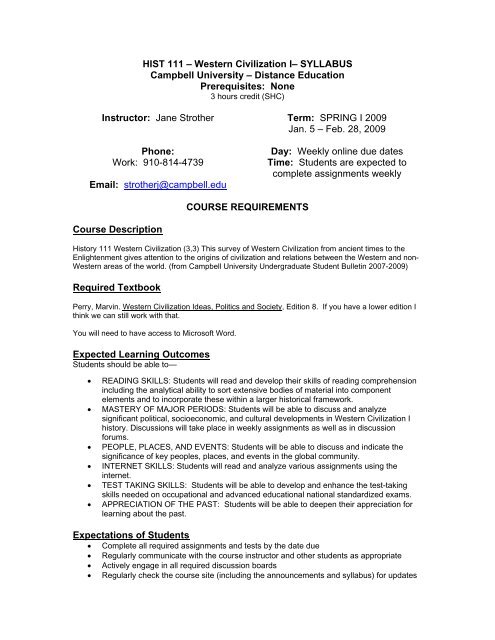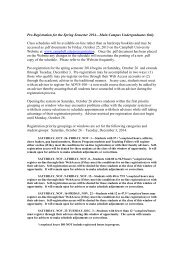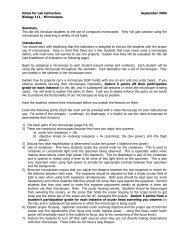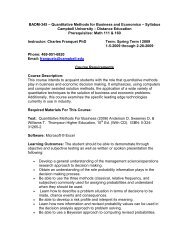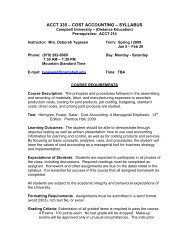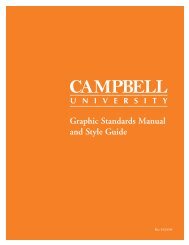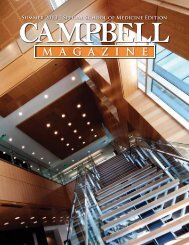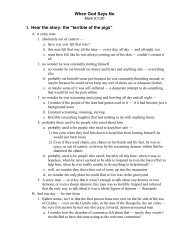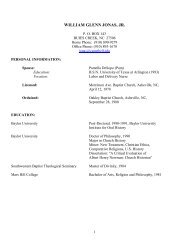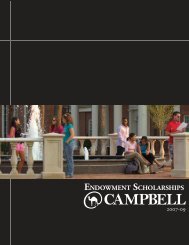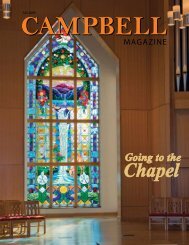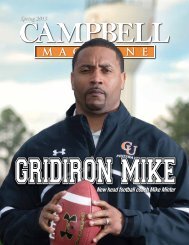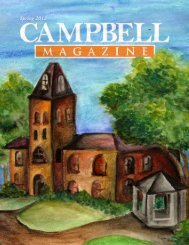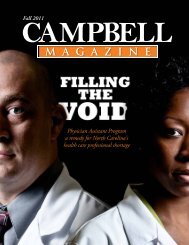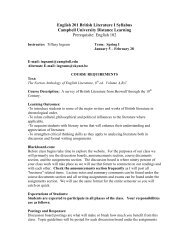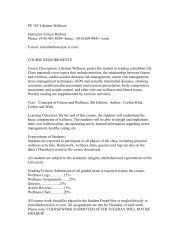HIST 112 â Western Civilization â SYLLABUS - Campbell University
HIST 112 â Western Civilization â SYLLABUS - Campbell University
HIST 112 â Western Civilization â SYLLABUS - Campbell University
You also want an ePaper? Increase the reach of your titles
YUMPU automatically turns print PDFs into web optimized ePapers that Google loves.
<strong>HIST</strong> 111 – <strong>Western</strong> <strong>Civilization</strong> I– <strong>SYLLABUS</strong><br />
<strong>Campbell</strong> <strong>University</strong> – Distance Education<br />
Prerequisites: None<br />
3 hours credit (SHC)<br />
Instructor: Jane Strother Term: SPRING I 2009<br />
Jan. 5 – Feb. 28, 2009<br />
Phone:<br />
Work: 910-814-4739<br />
Email: strotherj@campbell.edu<br />
Day: Weekly online due dates<br />
Time: Students are expected to<br />
complete assignments weekly<br />
COURSE REQUIREMENTS<br />
Course Description<br />
History 111 <strong>Western</strong> <strong>Civilization</strong> (3,3) This survey of <strong>Western</strong> <strong>Civilization</strong> from ancient times to the<br />
Enlightenment gives attention to the origins of civilization and relations between the <strong>Western</strong> and non-<br />
<strong>Western</strong> areas of the world. (from <strong>Campbell</strong> <strong>University</strong> Undergraduate Student Bulletin 2007-2009)<br />
Required Textbook<br />
Perry, Marvin. <strong>Western</strong> <strong>Civilization</strong> Ideas, Politics and Society, Edition 8. If you have a lower edition I<br />
think we can still work with that.<br />
You will need to have access to Microsoft Word.<br />
Expected Learning Outcomes<br />
Students should be able to—<br />
• READING SKILLS: Students will read and develop their skills of reading comprehension<br />
including the analytical ability to sort extensive bodies of material into component<br />
elements and to incorporate these within a larger historical framework.<br />
• MASTERY OF MAJOR PERIODS: Students will be able to discuss and analyze<br />
significant political, socioeconomic, and cultural developments in <strong>Western</strong> <strong>Civilization</strong> I<br />
history. Discussions will take place in weekly assignments as well as in discussion<br />
forums.<br />
• PEOPLE, PLACES, AND EVENTS: Students will be able to discuss and indicate the<br />
significance of key peoples, places, and events in the global community.<br />
• INTERNET SKILLS: Students will read and analyze various assignments using the<br />
internet.<br />
• TEST TAKING SKILLS: Students will be able to develop and enhance the test-taking<br />
skills needed on occupational and advanced educational national standardized exams.<br />
• APPRECIATION OF THE PAST: Students will be able to deepen their appreciation for<br />
learning about the past.<br />
Expectations of Students<br />
• Complete all required assignments and tests by the date due<br />
• Regularly communicate with the course instructor and other students as appropriate<br />
• Actively engage in all required discussion boards<br />
• Regularly check the course site (including the announcements and syllabus) for updates
• Be professional and respectful in all communications with the instructor and other<br />
students<br />
• Be honest and responsible<br />
• Be committed to success in the course<br />
Schedule of Course Activities and Response Methods and Times<br />
Below are the assignment due dates. All assignments must be completed on time. You may<br />
work ahead if you like.<br />
Each assignment has<br />
1) Reading from the textbook to complete<br />
2) Study Guide (These are to print out, answer, and study. They do not need to be sent to me.)<br />
3) Chapter Tests (located under the “Tests & Exams” button)<br />
4) Discussion Board Assignment<br />
Additional Work:<br />
5) Two Online Written Assignments located under the Assignments button (Submit in the<br />
course using –View/Complete-- by attaching your file with the Browse button.) More instruction<br />
will be given in the course.<br />
6)There will also be a paper and a Final Exam. The paper should be a minimum of 5 pages<br />
using at least 3 sources. Instructions will be given in the course. The Final Exam will come from<br />
the Textbook and Online Written Assignments for Assignments 1-5.<br />
Due Dates - <strong>HIST</strong> 111 – Fall II 2008<br />
Assignment Chapters and Information Covered Due Date<br />
Course<br />
Orientation<br />
Students will review the course syllabus<br />
(Syllabus button) and course orientation<br />
(Orientation button). Students will also<br />
take the Orientation Quiz and send an<br />
email to the instructor.<br />
Friday, Jan. 9<br />
Discussion<br />
Forum<br />
Introductions – submit a brief biography<br />
of yourself as an introduction to your<br />
fellow students in "This Course."<br />
Friday, Jan. 9<br />
Assignment 1 Chapters 1-3, Assignment 1 Test Friday, Jan. 16<br />
Discussion Ancient Religions Friday, Jan. 16<br />
Forum<br />
Assignment 2 Chapters 4-7, Assignment 2 Test Friday, Jan. 23<br />
Discussion Rome and America Friday, Jan. 23<br />
Forum<br />
Assignment 3 Chapters 8-11; Charlemagne Online Friday, Jan. 30<br />
Assignment, Assignment 3 Test<br />
Discussion Christian Persecution Friday, Jan. 30<br />
Forum<br />
Research Paper 5 pages and at least 3 resources Friday, Feb. 6<br />
Assignment 4 Chapters 12-14, Assignment 4 Test Friday, Feb. 13
Discussion<br />
Forum<br />
Assignment 5<br />
Discussion<br />
Forum<br />
Final Exam<br />
Renaissance <strong>Civilization</strong> Friday, Feb. 13<br />
Chapters 15-17; Henry 8 Online<br />
Friday, Feb. 20<br />
Assignment, Assignment 5 Test<br />
Glorious Revolution Friday, Feb. 20<br />
From Assignments 1-5 textbook and<br />
online assignments.<br />
Friday, Feb. 27<br />
The Professor reserves the right to change the schedule at any time.<br />
Grading Policies<br />
The following grading scale will be used:<br />
A: 90 - 100 percent<br />
B: 80 - 89 percent<br />
C: 70 - 79 percent<br />
D: 60 - 69 percent<br />
F: 60 and below<br />
W: Withdrew (no penalty and does not count<br />
on a student's grade point average)<br />
WF: Withdrew Failing -- (this is the same as an F. and will always be counted as an F and<br />
computed in a student's grade point average)<br />
COMPUTING A STUDENT'S GRADE:<br />
30% Homework Quizzes<br />
20% Online Writing Assignments<br />
10% Discussion Board participation<br />
20% Research Paper<br />
20% Final Exam<br />
CHECKING YOUR GRADE:<br />
The multiple choice part of the tests/exams will be immediately graded by the computer and each<br />
student's grade posted to a grade book. Discussion questions will be graded by the instructor and<br />
entered in the grade book. Students can check these grades at anytime by going to Tools and<br />
clicking on View Grades.<br />
CAMPUS REQUIREMENTS<br />
<strong>Campbell</strong> <strong>University</strong>’s Statement of Purpose: <strong>Campbell</strong> <strong>University</strong> is a university of the liberal<br />
arts, sciences, and professions which is committed to helping students develop an integrated<br />
Christian personality characterized by a wholeness that includes: a method of critical judgment;
an appreciation of our intellectual, cultural, and religious heritage; and a sensitive awareness of<br />
the world and society in which they live and work with persons.<br />
<strong>Campbell</strong> <strong>University</strong> is a Baptist university affiliated with the Baptist State Convention of<br />
North Carolina. Both in and out of the classroom, the <strong>University</strong> endeavors to present Christian<br />
principles to students and to foster their application to daily life.<br />
This course is consistent with the aforementioned purpose and provides students a<br />
positive environment for learning.<br />
ADA Statement: Students with documented disabilities who desire modifications or<br />
accommodations should contact the Office of Student Support Services located in the <strong>University</strong>’s<br />
Hight House. To contact this office, call (910) 814-4364 or email supportservices@campbell.edu.<br />
Attendance: <strong>Campbell</strong>’s attendance policy states that regular attendance is mandatory.<br />
Students may miss only 15% of classes. Any student missing more than 15% of classes may fail<br />
the course due to a lack of attendance. Students taking distance education classes need to meet<br />
the weekly timetables and due dates promulgated by the instructor. Failure to meet these<br />
deadlines may result in a failing grade.<br />
Inclement Weather: <strong>Campbell</strong> <strong>University</strong>’s policy is to remain in operation during periods of<br />
inclement weather. If extreme or emergency weather develops, the <strong>University</strong> will work through<br />
those situations as they develop. Distance Education courses will continue to run. Outages to the<br />
Blackboard server will be coordinated.<br />
Incomplete Work: (Instructors will issue grades of incomplete in conjunction with the Director of<br />
Distance Education,(coordination) and the guidelines provided in the <strong>University</strong> Catalog .)<br />
Internet/Email Requirements: This course utilizes email, and the Blackboard Learning system.<br />
Students are required to have and regularly monitor a valid email address and internet service<br />
provider. A <strong>Campbell</strong> <strong>University</strong> email account is preferred. Students will be contacted in most<br />
cases via the Blackboard platform. Students are directed to ensure that the email address<br />
entered in the Blackboard system is functional.<br />
Missed Classes: Students who are aware that they will miss a class should inform the instructor<br />
before class. Scheduled class assignments (tests, quizzes, etc.) may be re-scheduled or madeup<br />
with a prearranged, excused absence.<br />
Plagiarism: Plagiarism is any use of another person’s words or ideas without giving proper<br />
credit to the person from whom you borrowed the words or ideas. Plagiarism is the theft of<br />
intellectual property. Plagiarism includes the following:<br />
• Failing to cite properly any direct or indirect quotation(s) from professionally written<br />
materials (books, journal articles, etc.) student papers, projects, presentations, etc.<br />
• Submitting as your own work a paper, project, or presentation that you did not compose<br />
(that is, write, compile, draw, etc.)<br />
• Allowing another person to write your paper or develop your presentation or assignment.<br />
Students who plagiarize will be subject to failing the assignment and/or failing the course.<br />
Additional sanctions may be imposed by the Campus Director. See the Extended Campus<br />
Student Handbook for further information.<br />
Turnitin.com: “Turnitin.com” is a web-based service that provides online reviews of written<br />
material to judge if it has been copied from another source. Turnitin.com is used to evaluate the<br />
possibility of a student plagiarizing or cheating on written material. The instructor may require
students to submit written work in an electronic format for the purpose of utilizing the Turnitin.com<br />
service.<br />
Course Content<br />
I. The Ancient Near East: The First <strong>Civilization</strong>s<br />
II. The Hebrews: A New View of God and the Individual<br />
III. The Greek City-State: Democratic Politics<br />
IV. Greek Thought: From Myth to Reason<br />
V. The Hellenistic Age: Cultural Diffusion<br />
VI. The Roman Republic: City-State to World Empire<br />
VII. The Roman Empire: A World-State<br />
VIII. Early Christianity: A World Religion<br />
IX. The Heirs of Rome: Byzantium, Islam, and Latin Christendom<br />
X. The High Middle Ages: Vitality and Renewal<br />
XI. The Flowering of Medieval Culture: The Christian Synthesis<br />
XII. The Late Middle Ages: Crisis and Dissolution<br />
XIII. The Renaissance: Transition to the Modern Age<br />
XIV. The Reformation: Shattering of Christian Unity<br />
XV. European Expansion: Economic and Social Transformations<br />
XVI. The Rise of Sovereignty: Transition to the Modern State<br />
XVII. The Scientific Revolution: The Universe Seen as a Mechanism


